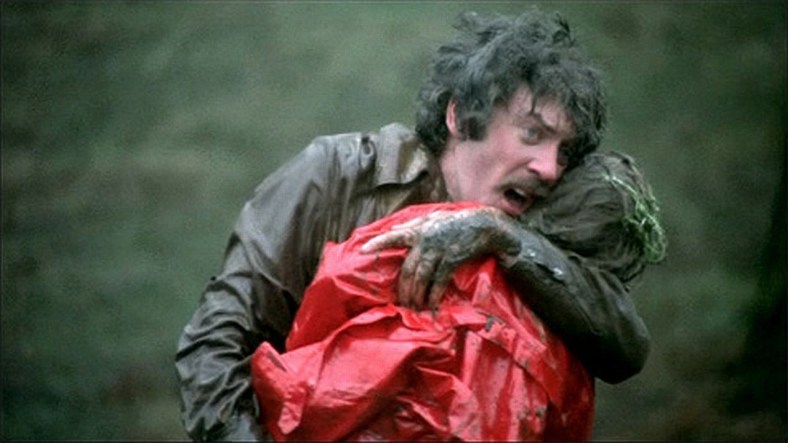‘Don’t Look Now’ Is a Devastating Meditation on Grief [The Overlooked Motel]

Welcome to The Overlooked Motel, a place where under-seen and unappreciated films are given their moment in the spotlight. I hope you enjoy your stay here and find the accommodations to be suitable. Now, please take a seat and make yourself comfortable. I have some misbehaving guests to ‘correct.’
Watch the latest episode now:
Today’s selection is a film celebrated in some circles but remains fairly under-seen by the masses. I am talking about Nicolas Roeg’s giallo-esque horror thriller, Don’t Look Now. This emotional roller coaster of a film is atmospheric, and intense, and features fully committed performances by two incredibly talented lead actors.
Don’t Look Now follows John and Laura Baxter (Donald Sutherland and Julie Christie), a wealthy couple with two young children whom they love dearly. On a quiet day at home, tragedy strikes. Their daughter, Christine (Sharon Williams), drowns in a body of water situated on their sprawling estate. Following that devastating loss, Laura and John travel to Venice, where John has been commissioned to restore a historic church. But the change of scenery does little to keep their minds off the loss of their beloved daughter. Matters only worsen when a chance encounter with a psychic gives the couple cause to believe Christine remains nearby. That ultimately leads to the bereaved parents becoming entangled in a series of unsolved murders along the Grand Canal.
Also Watch ‘Brainscan’: A Strange 1990s Horror Relic You Need To Watch ASAP [Watch]
Christine’s accident is a lot to take in. It’s profoundly tragic but beautifully rendered. Donald Sutherland conveys a palpable sense of pain in his turn as John. The character finds himself so grief-stricken that he can’t formulate words. In the absence of anything to say, John emits a series of guttural moans that effectively reveal the depths of his despair. Shortly thereafter, his spouse, Laura, catches a glimpse of the devastating development from their home and lets out a primal scream. Immediately after that, Roeg cuts to the next scene.
That jarring transition always leaves me feeling unsettled. The jump-cut mirrors the abrupt nature of Christine’s passing and leaves the viewer reeling from the aftermath. It serves to put the audience in a similar headspace to Laura and John following their daughter’s untimely death. But like the grieving parents, the viewer must push forward.
Grief and the ways it manifests are prevalent themes throughout Don’t Look Now. Laura and John know that their daughter is gone. But their desire to reconnect with her consistently overrides their better judgment, sending them on a harrowing journey that only leads to more devastation. They repeatedly defy logic in hopes that they’ll be able to reconnect with their little girl. Though their actions aren’t always rational, they make complete sense in the context of the film. Grief drives many of us to look for meaning where we can find it. But that desperation and search for significance at all costs backfire.
Also Watch: Stephen Dorff Stars In This Underrated Claustrophobic Thriller
The picture also deserves praise for its depiction of the impact the loss of a child has on a marriage. There are plenty of films that have tried to effectively capture the devastating toll that burying a son or daughter has on a parent. But Don’t Look Now serves as one of the most effective examples. Both John and Laura believably convey the utter desperation they feel. They become hollowed-out versions of their former selves. Absolutely everything that happens after Christine’s death is informed by that tragic turn of events.
The aftermath of that loss finds both leads more open to the power of suggestion. This is especially apparent when a psychic says she can see Christine in the present tense. Laura is more than willing to believe what she is told for the chance to feel a connection to her little girl.
Speaking of connection, the film’s once-controversial sex scene serves as far more than just a tawdry display of flesh, as some saw it upon the film’s release. The couple engages in intimacy after Laura becomes convinced Christine is still with them in some capacity. Moments prior she sees Christine’s ball in her suitcase and smiles. That suggests she is momentarily at peace and that fosters a feeling of hope that brings the couple together. As such, that development adds nuance to the proceedings and helps us better understand the headspace the characters are in.
Also Read: David Cronenberg’s Favorite Horror Movie Is This Unmissable Classic
Depictions of onscreen intimacy aside, the film’s most harrowing sequences are effectively staged alongside a dissonant score composed by Pino Donaggio. The musical accompaniment adds an extra measure of menace to the already devastating proceedings and continues to underscore key moments throughout the narrative. One noteworthy example is the music that precedes Laura’s fainting episode in the restaurant. It’s just a single extended note. But it’s very powerful and conveys a proper sense of menace.
All in all, Don’t Look Now is a harrowing portrait of loss intertwined with a suspenseful murder mystery. The performances are fantastic and the score is amongst Pinot Donaggio’s best work. If you’re interested in checking the film out, you can find it available as a digital rental or on physical media.
That’s all for this installment of The Overlooked Motel. If you’d like to chat more about under-seen and underrated films, feel free to hit me up with your thoughts on Twitter, Threads, or Instagram.
Categorized:Editorials The Overlook Motel

